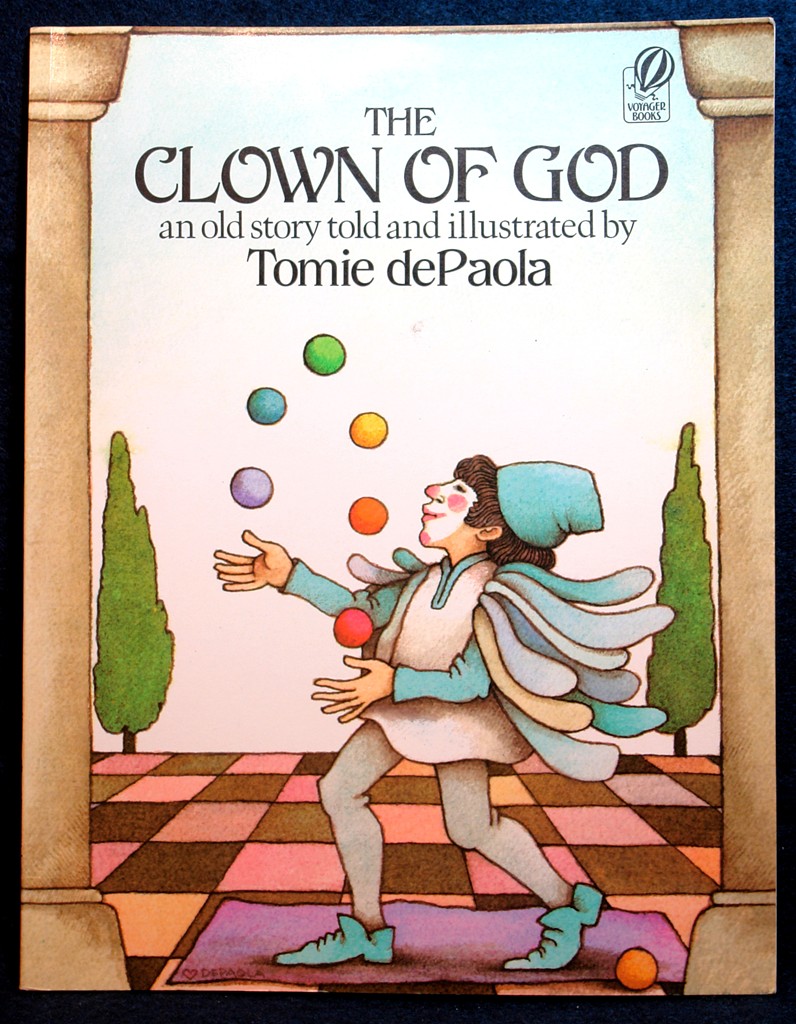“A sacrilege,” the Brother Sexton cries out. “Come quickly!” he calls to the priest.
Something appalling is taking place at the altar in the monastery chapel in Sorrento, right in front of the statue of Mary and Jesus. What do you suppose it could be that would send the Sexton running? Was the chapel being damaged, the statue defaced? Was a villager committing some reprehensible sin inside the very walls of the church?
No. The sacrilege was nothing more than Giovanni, the juggler, performing for the Holy Child, offering his humble gift to Jesus.
Giovanni had come a long way from his youth in Sorrento, sleeping in doorways and juggling fruits and vegetables to earn bowls of soup from Signor Baptista’s wife. He’d set out with a group of traveling players. He’d perfected his skills. He’d juggled sticks, plates, clubs, rings, and burning torches. He’d traveled over Italy. He’d performed for a duke and a prince.
When he came across some Little Brothers one day, they told him how “everything sings of the glory of God.” Even his juggling. Giovanni didn’t think much of it. Not until the years drew on and he grew old and one day he dropped one of the balls he was juggling. The villagers threw stones at him, and Giovanni gave up his craft.
All his life he had sought to share his gift, but he didn’t understand its value, and when it failed, he thought himself nothing. It was only at the very end, when he traveled home to Sorrento and stumbled into the monastery seeking shelter, that Giovanni found his joy and his purpose. When he saw the statue of Jesus, so grim and still in the monastery chapel, he understand the Little Brothers’ words. He understood that he had something to give after all. His juggling would bring delight to his Maker. It was no sacrilege, but the very best of himself, the Creator’s gift to Giovanni lovingly returned to Him.
Tomie dePaola’s “The Clown of God” is based on an ancient French legend. I’d never heard of it until I stumbled on this book. And though the ending is sad, my children loved the story and asked me to read it again and again. They’re not old enough, I suppose, to have been corrupted by the lie that the world is divided into sacred and secular. They accepted, quite easily, that the juggler’s offering was every bit as valuable as the Brother Sexton’s work in the monastery. DePaola’s moving and lovely retelling of the legend reinforces a truth I want them firmly settled in: that whether they be artists or park rangers or chefs or mechanics, the offering of themselves to the God who made them is the best, the only life worth living.
- The School of Wonder - September 18, 2023
- Celebrations - December 6, 2021
- The Junkyard Wonders - October 6, 2021

This is a favorite at our house, too. It leads to great conversations every time we close the cover, and it has one of my absolute favorite endings. Thanks for the review, Helena!
Yes, Josh! I so agree. Side note: I was recently looking through some favorite quotes and realized that one of them was yours! Bravo! I look forward to reading more of your stuff.
Aw, shucks.
I love this story too, Helena. Thanks for reminding me of it!
You’re welcome, Laura!
Dear Helena,
I write to you from Hungary. I know another version of this story, with Santa Mary, but would very much like to get to know this one as well. I cannot find the full story neither online nor in a copy here in Hungary. Could you please be so kind as to send me the text of the tale?
Thank you so much for your kind help!
Hello Aniko!
You can find the version of the story that Helena reviews on Amazon: https://www.amazon.com/Clown-God-Tomie-dePaola/dp/0156181924